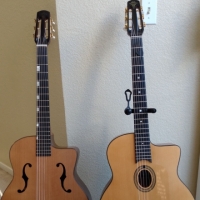DjangoBooks.com
Welcome to our Community!
Categories
- 20K All Categories
- 1.1K General
- 485 Welcome
- 60 Archtop Eddy's Corner
- 146 CD, DVD, and Concert Reviews
- 385 FAQ
- 26 Gypsy Jazz Italia
- 27 Photos
- 209 Gypsy Picking
- 21 Unaccompanied Django
- 15 Pearl Django Play-Along Vol.1
- 17 Gypsy Fire
- 45 Gypsy Rhythm
- 1.4K Gypsy Jazz University - Get Educated
- 131 Gypsy Jazz 101
- 231 Repertoire
- 227 History
- 709 Technique
- 51 Licks and Patterns
- 6 Daniel Givone Manouche Guitare Method Users Group
- 20 Eddie Lang Club
- 1.3K Gypsy Jazz Gear
- 816 Guitars, Strings, Picks, Amps, Pickups and Other Accessories
- 465 Classifieds
- 52 Recording
- 63 Other Instruments
- 18 Violin
- 5 Mandolin
- 22 Accordion
- 7 Bass
- 11 Woodwinds
- 351 Gypsy Jazz Events
- 144 North America
- 112 Europe
- 95 International
In this Discussion
Who's Online (0)
Jamming tips: how to feel well and how to behave ;-)
 Melvin Koenings
New
Melvin Koenings
New
When playing in a jam session, there are some important rules to the game to keep in mind. Although most jams look quite informal, there are certain rules, a kind of jam etiquette which ensures that things go smoothly, every player gets to shine, the audience is entertained. But also that the music becomes something greater than the sum of its musicians and their egos, due respect is given and no-one is insulted or offended and everyone has fun and walks out at the end of the night feeling good.
Recently I wrote this paper on jam session guidelines, hope you all enjoy!
http://www.grappellicamp.com/wp-content/uploads/2016/12/Jam-Session-guidelines-GDC-2017.pdf
Recently I wrote this paper on jam session guidelines, hope you all enjoy!
http://www.grappellicamp.com/wp-content/uploads/2016/12/Jam-Session-guidelines-GDC-2017.pdf
Tagged:












Comments
That's definitely not the only jam in Portland.
1. I think it is important to include everyone by choosing songs that they know the entire group is capable of having fun with. For example: Don't call a waltz when you know nobody else learned the melody. Also, it is no fun to play a song that has a long form and takes 5+ minutes to get 1 time around the circle.
2. Also, I find that sometimes people practice new songs at home and then they want to use the jam session to show off their new tune without considering that the rest of the group isn't familiar with the song.
3. Also, jammers probably shouldn't use public jam sessions as the only time that they ever practice. If you call a tune, you should have practiced it before and also comfortable playing the melody, soloing on it, and ending it.
Personally, I like it when someone brings to the jam a less well known tune (provided it's from Django repertoire, of course). The form is usually simple in this style - you can pick up the changes on the spot, or the guy who is bringing the melody can usually explain the chords in < 1 minute.
Django has almost a thousand tunes in Integrale. I think most guys know something like 30 of them, which is such a shame. There are some real gems in there that just go ignored, even though they can be great jam tunes too.